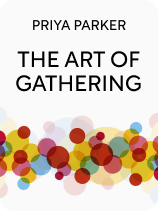

This article is an excerpt from the Shortform book guide to "The Art of Gathering" by Priya Parker. Shortform has the world's best summaries and analyses of books you should be reading.
Like this article? Sign up for a free trial here.
Is it awkward asking people to leave a party? How do you end a party properly?
At the end of an eventful party, it can feel awkward to push people out. However, the fun has to end eventually and Priya Parker’s book The Art of Gathering has all you need to make ending a party less uncomfortable.
Let’s look at how to end a party successfully.
How to Close the Gathering
Eventually, your gathering will have to end—and treating this ending with the respect it deserves will cement the experience in your guests’ minds. We’ll first explain why deliberately closing your gathering matters. Then, we’ll share Parker’s advice on how to end a party in a way that honors the rest of your work.
Parker explains that deliberately closing your gathering is essential because it provides your guests with a transition. As Parker notes, endings are inherently sad, so many people deliberately avoid officially closing their gathering. For example, the party host lets the guests trickle out rather than signaling that they should go home.
(Shortform note: Cultural differences in how hosts close their gatherings may convince a guest that a host hasn’t deliberately closed their gathering when in fact they have. For example, in the Midwestern United States, a “welp” from the host signals that the gathering is now over—but someone not familiar with Midwestern English wouldn’t interpret that as an official close.)
However, Parker argues that not deliberately closing your gathering does your guests a disservice. If you’ve hosted well, you’ve created a transformative experience—and, just as you helped your guests transition from their regular lives to the experience of your gathering at its beginning, it’s also your duty to help them accept the end of this experience and transition back into their normal lives.
(Shortform note: No matter how well you close your gathering, your guests may still struggle to transition back to their normal lives. For example, the K-pop band BTS has an elaborate and deliberate close to their concerts that takes up nearly a third of the concert. But BTS fans still often experience sadness and separation anxiety post-concert, despite being eased back into their normal lives.)
So how do you help them transition? The first step, according to Parker, is to signal the end to your guests. Figure out a way to let them know that things are drawing to a close and so they should behave accordingly. If you’re not sure when to signal this (like if you’re hosting a party with no set endpoint), do it when you feel that the gathering has fulfilled its reason but is still somewhat lively; if you wait too long, your gathering will lose momentum and end on a less memorable note.
(Shortform note: Even if your gathering hasn’t yet fulfilled its reason, you may be forced to signal the end to your guests due to external circumstances—such as the closing of your gathering venue. If so, you may wish to continue the gathering in a separate place. For best results, consider whether you should have some type of afterparty before the end draws near—keeping in mind both the venue and the guest list. For example, if you’re having a wedding, you should consider planning for an afterparty if your guests are on the younger side and likely to want to keep the party going after your reception venue closes.)

———End of Preview———
Like what you just read? Read the rest of the world's best book summary and analysis of Priya Parker's "The Art of Gathering" at Shortform.
Here's what you'll find in our full The Art of Gathering summary:
- How to make pre-planned gatherings more meaningful and engaging
- What to do before, during, and after any type of gathering
- Why the host should never relax during their event






